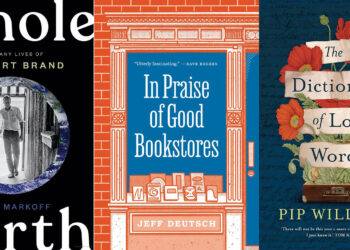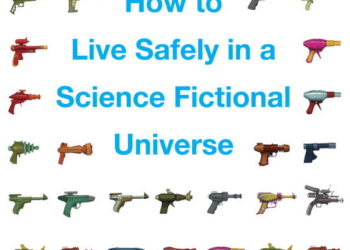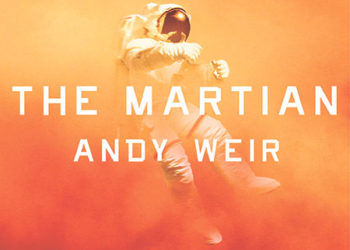Editor’s Note: Every year as we enter the holiday season, we take a moment to pause and look back on the best books we encountered (not a “best books of 2022″ list, but a list of the best books the Chefs read during 2022 — the books might be classics, a few years old, or brand new). In recent years we expanded our list to include any sort of cultural creation or experience our Chefs wanted to share.
Here’s Part 2 of our list, Part 1 is also available.
David Crotty
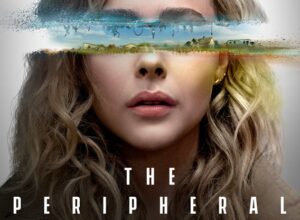 One of the things I’ve enjoyed most this year has been the Amazon Prime adaptation of William Gibson’s novel The Peripheral, which David Smith wrote about in these pages back in 2014. I had my concerns as the series began, given how poorly most adaptations of Gibson’s work have turned out. In his books, the plot is largely a macguffin, a vehicle for Gibson’s sharp prose and prescient observations about technology and where the world is going. Good Science Fiction is never about the future, but rather reflects the current day, or at least in Gibson’s hands, the day after tomorrow. He’s always remained about five years ahead of where we are with frightening precision.
One of the things I’ve enjoyed most this year has been the Amazon Prime adaptation of William Gibson’s novel The Peripheral, which David Smith wrote about in these pages back in 2014. I had my concerns as the series began, given how poorly most adaptations of Gibson’s work have turned out. In his books, the plot is largely a macguffin, a vehicle for Gibson’s sharp prose and prescient observations about technology and where the world is going. Good Science Fiction is never about the future, but rather reflects the current day, or at least in Gibson’s hands, the day after tomorrow. He’s always remained about five years ahead of where we are with frightening precision.
All of which makes for a great expansive read, but doesn’t necessarily make for a compelling short form movie or television series. The makers of The Peripheral have wisely strayed from the novel’s text – incorporating the settings and characters and basic concepts of the book but concentrating the complex plot down to a much more straightforward through line. The story takes place in a near future rural North Carolina and a more distant London, where “quantum tunneling” allows for data transfer between the past and the present, essentially time travel via telepresence. The titular peripherals are artificial bodies in the future London that our main characters can inhabit via virtual reality. Once contact is made between future and past, a new timeline, or stub, is created, forking that past off from the London timeline. Nefarious forces in future London are using stubs as experimental systems, testing new drugs and technologies on a population unaware that they are serving as guinea pigs. The show is beautifully filmed, spacious and thoughtful, and superbly acted (Chloe Grace Moretz shines as the main character, Flynne Fisher).
Not lost in the translation are Gibson’s concepts of the “Jackpot”, the long-running confluence of climate change, pandemics, and other factors that build over hundreds of years to a catastrophic tipping point for society, as well as the “kleptocracy”, where governments increasingly resemble organized crime. Given how accurate Gibson has been in the past with his near-term visions of the future, neither of these bodes particularly well for us.
And to borrow from Joe Esposito’s notion yesterday that one book leads to another, the shift in plot of the tv series inspired me to go back and re-read the book, which then led me to re-read Gibson’s first novel, 1984’s Neuromancer. It still holds up well, but offers a great contrast to the sparse and precise The Peripheral in its over-stuffed, manic pace. It is clearly the work of a younger author, filled to the brim with ideas, inventing terms still in common use, and driving the creation of a new genre of literature. Gibson’s mastery of his craft becomes evident in his more recent works (Pattern Recognition is still the best novel I’ve ever read about marketing), where the ideas are as robust but the pace is far less jittery, allowing those ideas the room they need to be fully considered.
The series wraps up this Friday with its final (eighth) episode, which offers the opportunity for a binge watch over the holidays. It is the rare adaptation that offers a novel take on the source material, creating a new stub to the book’s original timeline.
Jill O’Neill
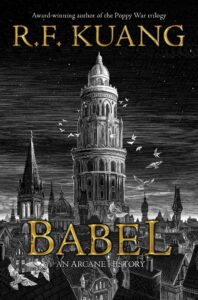 Do you have someone on your list who is into fantasy or speculative fiction? Let me recommend Babel by R.F. Kuang. It’s set in an alternate Oxford University in a somewhat alternate nineteenth century world.
Do you have someone on your list who is into fantasy or speculative fiction? Let me recommend Babel by R.F. Kuang. It’s set in an alternate Oxford University in a somewhat alternate nineteenth century world.
A young boy is rescued from poverty amidst a cholera epidemic in Canton, China. He becomes the ward of a faculty member of Oxford University. His facility with languages is fostered and bolstered so that he will be able to join Oxford when he comes of age – specifically as a part of Babel. Babel is a distinctly academic research environment in support of silver-magic which operates as technological infrastructure in this alternate version of 1830’s England. It’s driven by translation and understanding of linguistic meaning. (The author is currently pursuing a PhD in linguistics at Yale and she’s done a brilliant job at explaining to the casual reader some of the challenges associated with translation work).
I was expecting something lightweight fantasy — some sort of coming-of-age quest, dragons flying over Oxford’s gleaming spires, or perhaps something darker – more eldritch.
Instead, the 500+ pages of the novel deliver a harsh social commentary. One should probably pay attention to the subtitle which is Or the Necessity of Violence: An Arcane History of the Oxford Translators’ Revolution. After a very slow initial build in developing a central cohort of four characters and their unequal situations, I found sudden twists would catch me off guard. I would fully expect Babel to be up for a Hugo Award next year. The story arc escalates and escalates and escalates as it examines the faults and failures of imperialistic trade and colonial exploitation. There is a wicked and emotional punch by the close.
Rick Anderson
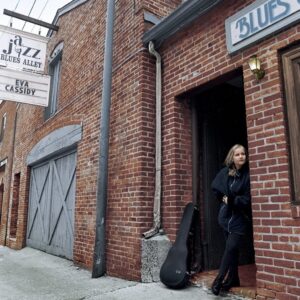 As usual, since my book-reading habits are pretty uninspiring (I mostly read articles for enlightenment, and crime novels for pleasure), I’m going to offer instead some music recommendations. The 25th-anniversary reissue of Live at Blues Alley, by the late and lamented Eva Cassidy, represents one of the most stunning vocal performances I’ve heard in years. Cassidy was equally comfortable crooning jazz standards and belting out gritty R&B and smooth pop, and her voice was an absolute joy to hear. The all-male vocal ensemble Dionysos Now! has been been releasing a series of recordings featuring choral works by the underappreciated 16th-century Franco-Flemish master Adrian Willaert, and several of them emerged this year – I normally prefer mixed-voice groups, but these albums are truly special. Jazz guitarists Sylvie Courvoisier and Mary Halvorsen released a duo album titled Searching for the Disappeared Hour that really turned my head around, as did pianist/composer Lara Downes with her adventurous reimaginings of Scott Joplin’s music on Reflections: Scott Joplin Reconsidered. The great clawhammer banjo player Allison de Groot and the equally great fiddler Tatiana Hargreaves teamed up for the unusually (for this genre) political and deeply enjoyable Hurricane Clarice. And France officially took over from Germany as the European epicenter of red-hot roots and dancehall reggae, producing a cavalcade of brilliant albums from the likes of L’Entourloup, Puppa Nadem, George Palmer, and scene veteran Tomawok. (For those who are interested, I recommend new recordings for library collections every month at CD HotList: New Releases for Libraries.)
As usual, since my book-reading habits are pretty uninspiring (I mostly read articles for enlightenment, and crime novels for pleasure), I’m going to offer instead some music recommendations. The 25th-anniversary reissue of Live at Blues Alley, by the late and lamented Eva Cassidy, represents one of the most stunning vocal performances I’ve heard in years. Cassidy was equally comfortable crooning jazz standards and belting out gritty R&B and smooth pop, and her voice was an absolute joy to hear. The all-male vocal ensemble Dionysos Now! has been been releasing a series of recordings featuring choral works by the underappreciated 16th-century Franco-Flemish master Adrian Willaert, and several of them emerged this year – I normally prefer mixed-voice groups, but these albums are truly special. Jazz guitarists Sylvie Courvoisier and Mary Halvorsen released a duo album titled Searching for the Disappeared Hour that really turned my head around, as did pianist/composer Lara Downes with her adventurous reimaginings of Scott Joplin’s music on Reflections: Scott Joplin Reconsidered. The great clawhammer banjo player Allison de Groot and the equally great fiddler Tatiana Hargreaves teamed up for the unusually (for this genre) political and deeply enjoyable Hurricane Clarice. And France officially took over from Germany as the European epicenter of red-hot roots and dancehall reggae, producing a cavalcade of brilliant albums from the likes of L’Entourloup, Puppa Nadem, George Palmer, and scene veteran Tomawok. (For those who are interested, I recommend new recordings for library collections every month at CD HotList: New Releases for Libraries.)
Charlie Rapple
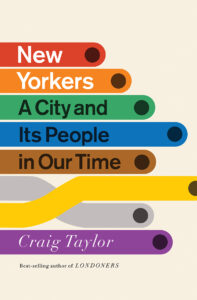 This year I’ve continued my love affair with New York, and my book of the year is New Yorkers: A City and Its People in Our Time by Craig Taylor. I have done much of my recent reading on the Kindle, where I have got into the habit of highlighting phrases that appeal to me. I have highlighted great swathes of Taylor’s New Yorkers. And looking back through them, I’m a bit bemused — what was it that grabbed me about that? But I remember being so immersed, so dazzled, so moved when I was reading it. The dentist talking about the effect of 9/11 on his patients’ mouths. The search dogs who got depressed because they never found people alive. The poignancy of family photos littering the neighborhood after Hurricane Sandy. The logistics of piloting the balloons in the Macy’s parade (“watch when you get to this cross street, the cross winds are 20mph”). The airport security guard who has learned to say “Belt, watch, wallet, cell phone, camera, keys, coins” in multiple languages to be a bit friendlier to people passing through (“their face lights up .. then they want to have like a whole conversation with you, so wait, wait, wait. We could talk about watches, wallets, keys, coins all day long. But after that, I don’t know.”) What it’s like being the electrician fixing the antennae on the top of the Empire State Building, outside, 104 floors up, in 60mph winds, in January. The fact that the elevators in the Flatiron Building were “driven by water. With leather seals.” Or the fact that the Panorama of New York in the Queens Museum is the world’s largest architectural model (must go there next time I’m in NYC). What it’s like being the Black chef at upscale white people’s parties (“Oh, you’re not that kind of Black person.”) Lawyers, car dealers, homeless people, thieves, nannies to the rich, sewer engineers, and on and on. “It’s like I’m in a movie. A documentary of me trying to make it in New York.” Taylor’s touch is so light that it feels like you are reading verbatim transcripts. Maybe you are. Maybe all New Yorkers really are this poetic.
This year I’ve continued my love affair with New York, and my book of the year is New Yorkers: A City and Its People in Our Time by Craig Taylor. I have done much of my recent reading on the Kindle, where I have got into the habit of highlighting phrases that appeal to me. I have highlighted great swathes of Taylor’s New Yorkers. And looking back through them, I’m a bit bemused — what was it that grabbed me about that? But I remember being so immersed, so dazzled, so moved when I was reading it. The dentist talking about the effect of 9/11 on his patients’ mouths. The search dogs who got depressed because they never found people alive. The poignancy of family photos littering the neighborhood after Hurricane Sandy. The logistics of piloting the balloons in the Macy’s parade (“watch when you get to this cross street, the cross winds are 20mph”). The airport security guard who has learned to say “Belt, watch, wallet, cell phone, camera, keys, coins” in multiple languages to be a bit friendlier to people passing through (“their face lights up .. then they want to have like a whole conversation with you, so wait, wait, wait. We could talk about watches, wallets, keys, coins all day long. But after that, I don’t know.”) What it’s like being the electrician fixing the antennae on the top of the Empire State Building, outside, 104 floors up, in 60mph winds, in January. The fact that the elevators in the Flatiron Building were “driven by water. With leather seals.” Or the fact that the Panorama of New York in the Queens Museum is the world’s largest architectural model (must go there next time I’m in NYC). What it’s like being the Black chef at upscale white people’s parties (“Oh, you’re not that kind of Black person.”) Lawyers, car dealers, homeless people, thieves, nannies to the rich, sewer engineers, and on and on. “It’s like I’m in a movie. A documentary of me trying to make it in New York.” Taylor’s touch is so light that it feels like you are reading verbatim transcripts. Maybe you are. Maybe all New Yorkers really are this poetic.
Discussion
1 Thought on "Chefs’ Selections: Best Books Read and Favorite Cultural Creations During 2022, Part 2"
Love this! I’ve been enjoying both The Peripheral and Babel recently, both outside my typical fare, and appreciate the other recs, too.
